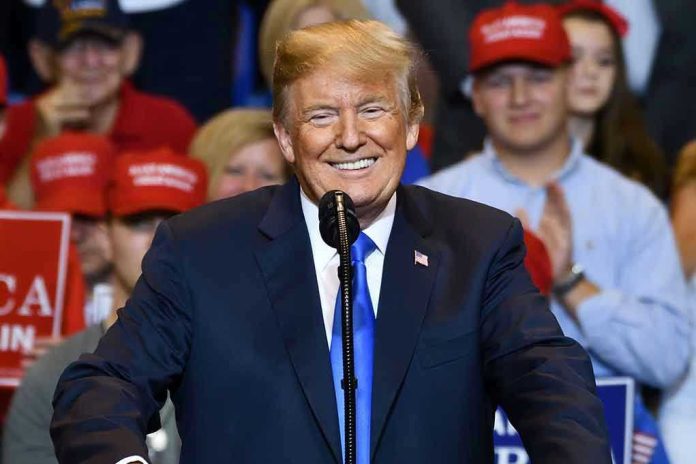
When a U.S. president calls his son “a good boy” on a hot mic moments after a foreign leader requests a meeting—while both men’s fortunes are tied to luxury real estate projects in that very country—the world stops and wonders: where does diplomacy end and private business begin?
Story Snapshot
- A live microphone at an international summit caught Indonesia’s president requesting a meeting with Eric Trump, sparking conflict-of-interest concerns.
- President Trump’s offhand, “He’s such a good boy. I’ll have Eric call you,” reignited debate over business entanglements and presidential ethics.
- Eric Trump’s public response and the Trump Organization’s Indonesian deals became focal points for watchdog scrutiny.
- The incident highlights unresolved questions about the separation between U.S. foreign policy and private business interests.
The Hot Mic Heard Round the World
The Gaza ceasefire summit in Sharm El-Sheikh, Egypt, buzzed with world leaders and high-stakes diplomacy. Minutes after President Trump finished his public remarks, a live microphone betrayed what was meant to be a private moment: Indonesian President Prabowo Subianto leaned in with a request—he wanted to meet Eric Trump, the executive vice president of the Trump Organization and the president’s son. Trump, without hesitation, replied, “He’s such a good boy. I’ll have Eric call you.” The exchange, quickly blasted across global headlines, was not just awkward—it was evidence, captured in real time, of the uneasy coexistence between the Trump family’s business empire and the U.S. presidency. For the American public, the question echoed: Was this diplomacy, or dealmaking?
Media and policy experts wasted no time dissecting the clip. The Trump Organization’s projects in Indonesia—massive luxury resorts in partnership with Hary Tanoesoedibjo’s MNC Land—had been under scrutiny since their inception in 2015. Now, the world saw the very intersection of private gain and public office that watchdogs had warned about for a decade. The hot mic gave critics a vivid, undeniable moment: a foreign head of state, business entanglements, and the president’s son, all in the same breath. The airwaves filled with questions about firewalls, ethics, and whether American interests were being subtly sold along with a brand.
Business and Politics: A Tangled Legacy
The Trump Organization’s Indonesian ventures did not materialize overnight. Since 2015, deals with MNC Land in Lido City and Bali had drawn praise for ambition and criticism for timing. Prabowo Subianto’s rise to Indonesia’s presidency in 2025 added a new twist—he was both a political power and a gatekeeper to the very projects bearing the Trump name. The summit’s intent was peace in Gaza, but suddenly, the narrative shifted: Could a president’s business ties compromise America’s foreign policy priorities? Ethics groups quickly revived warnings from Trump’s first term (2017–2021), accusing the family of blurring lines between government and personal gain. The phrase “firewall” became a punchline to those who saw evidence of business as usual, only now on the global stage.
The Trump family’s defense was swift and familiar. Eric Trump, fielding interviews in the days after the incident, emphasized that Indonesia’s deals predated any public office. “I am a good boy. I’ve never met the president [Subianto]… There’s so much of a wall that the guy has never met me,” he insisted. The Trump Organization reiterated: No new deals since his father took office. Indonesian officials tried to downplay the moment, calling it a private chat between friends. But the echo of that hot mic refused to fade, fueling coverage from ABC News, The Independent, CNN, and Forbes. The firewall, it seemed, had holes big enough for the world to peer through.
Ethics, Scrutiny, and the Price of Perception
Watchdog groups like Citizens for Responsibility and Ethics in Washington (CREW) pounced, calling the incident “not normal” and a fresh example of ongoing conflicts of interest. Ethics experts, such as Tony Carrk of Accountable.US, declared, “There is no line between Trump presidential and personal business.” Legal scholars pointed to a decade of debate about the adequacy of the Trump family’s business separation. The facts were not in dispute: Indonesia’s projects began before Trump’s presidency, and no evidence indicated new deals after his 2025 return. Yet, the perception of impropriety—of foreign policy entangled with private profit—remained toxic. For conservatives and common-sense Americans, the unease was not just about legality. It was about trust: Can a leader truly serve the public when his signature is stamped on private towers overseas?
On the other side, supporters argued that legacy projects should not disqualify the Trump family from conducting business, provided no new agreements were inked in office. They saw the media furor as political theater, a rehash of old grievances. Indonesian officials echoed this downplay, emphasizing the personal, not political, nature of the exchange. Yet, for critics, the incident was a siren: a reminder that when power and profit walk hand in hand, the line between national interest and personal enrichment can disappear in a whisper—or a hot mic’s hiss.
The Fallout: Public Debate and Policy Ripples
No formal investigation has been announced, but the incident’s impact continues to ripple outward. Public debate centers on whether existing safeguards against conflicts of interest are adequate for modern, globally connected leaders. The Trump Organization faces reputational risk in both business and politics, particularly if diplomatic relationships appear transactional. In Indonesia, the projects may proceed, but scrutiny from both governments and civil society is now guaranteed. For the American public, the story is a test case: Can the nation enforce ethical boundaries when the presidency and private enterprise are family affairs?
The hot mic moment is unlikely to fade soon. It is a case study in the persistent tension between old rules and new realities—between the demands of public trust and the temptations of private fortune. As long as world leaders double as business moguls, the question will remain: who, exactly, are they working for?

